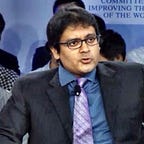Test of Responsible Leadership: Can you go Beyond Tolerance?
We convened at the London School of Economics on 25th November 2016 under the banner of “Beyond Tolerance: Citizenship, Diversity & Constructive Conflict”. Several academic, corporate, social enterprise and media leaders took part alongside members of the World Economic Forum community of Young Global Leaders and Global Shapers.
I thought we’d start by asking: what lies beyond tolerance? What is the space on the other side of tolerance?
Is it a breaking point or a bursting of the dam when you feel, “I can’t put up this pretense anymore. I’m tired of being politically correct, tired of having to pretend that I don’t have concerns or fears in case I get branded a racist, xenophobic or some other kind of phobic? Can I not just curl up in my post-truth blanket and enjoy my dislike for experts”?
Or is the space beyond tolerance filled with mutual understanding, empathy, suspension of judgement and a proactive search for diversity?
Forces of polarization are tearing at our social fabric. Sure, some of the sources of stress are real. There are economic, demographic and technology challenges. It’s the all-encompassing fourth industrial revolution!
But at least some of the sources are man-made. And I’m afraid, you and I are suckers for it.
We all have our biases, prejudices, fears and grievances that are mostly legitimate. But then, we let all of these get hijacked and whipped up from frustration to rage, from rage to hate and at times, from hate to violence.
We’ve become rusty at constructive conflict.
If you disagree with me, it must mean that I hate you. Personally. I will question your integrity and motivation. I will not isolate the person from the issue of disagreement.
I also cannot separate or compartmentalize areas of disagreement. If you disagree with me on one topic, I will have to disagree with you on the next topic — whatever that topic is — just to retaliate.
Let me illustrate with two tweets that you may have seen recently:
The first one says,
“The cast and producers of Hamilton should immediately apologize to Mike Pence”.
The second one says,
“I cancelled today’s meeting with the New York Times when the terms and conditions of the meeting were changed at the last moment”.
There’s nothing wrong with either of these two. Except that the original tweets actually came with extra clauses as italicized below:
“The cast and producers of Hamilton, which I hear is highly overrated, should immediately apologize to Mike Pence”.
“I cancelled today’s meeting with the failing @nytimes when the terms and conditions of the meeting were changed at the last moment”.
I don’t know if it was failing five minutes ago when the meeting was still on!
In both cases, the descriptive clauses may or may not be true, but they don’t serve the argument — except to attack and denigrate the subject in a general way.
But please don’t laugh. This is not an aberration. You and I do that all the time.
As we see in some parts of the Brexit debate, fears around migration, lampooning judges who you don’t agree with or even generalized bashing of certain professions and apparently-evil-but-unnamed big businesses —the license for all forms of generalized hate comes from the same place. This is true in all echo-chambers — whether religious, secular, right-wing or left-wing.
What do I wish to see beyond tolerance?
I’d like to know if we can stop ourselves as individuals from succumbing to some of the emotional triggers of polarization. Furthermore, I’d like us as a community to become immunized against exploitative polarization.
Next time, when someone comes to me with the language of Us & Them, I want to be able to say “No we’re cool. We have problems, but we’re dealing with them constructively”.
Or the next time someone says to me “you’re excluded, you don’t belong here”, I can point to areas where I’ve been proactively included and say “What are you talking about?”
Or the next time we read a headline in the media that is deliberately designed to get my goat, I don’t give them my custom.
Is all of this a bit too idealistic? Possibly. But I clearly don’t believe so.
Smoking was cool in my father’s generation. It isn’t so anymore. Our attitudes to climate change or towards LGBT communities is different now than it was two decades ago. All over the world, there are inspiring stories of real positive change that we need to magnify and replicate.
So what lies beyond tolerance? I hope it’s constructive conflict and proactive diversity. That’s the new test of responsible leadership. Whatever your views and whatever your cause, you are not a leader if you don’t practice constructive conflict. Let the counter-insurgency begin.
|���y���
